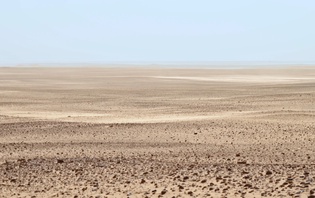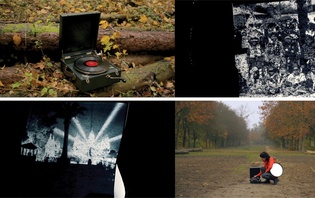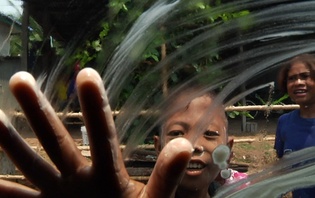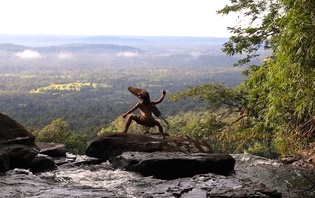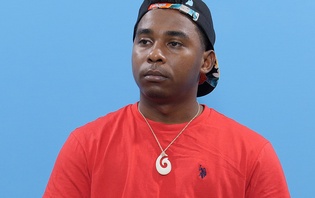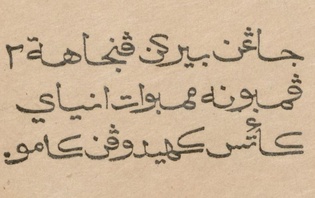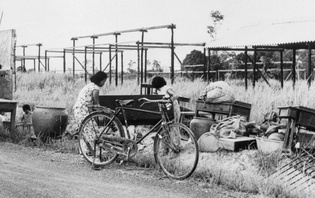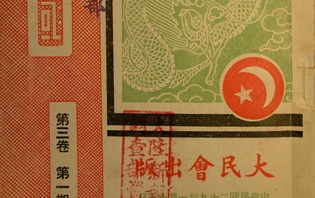Bodies of Occupation: Conversation with the art collective Fraud
This conversation with Fraud will explore their work Carbon Derivatives, an art-led enquiry into forest and foreshores as salvage sites for carbon incorporating questions such as salvage accumulation, waste management, indentured labour and slavery.

Carbon Derivatives (2018-ongoing), courtesy of the artists.
Participants
Ariadne Collins is a Lecturer at the School of International Relations at the University of St Andrews. Her work lies at the intersection of climate change governance, environmental policy and international development. More specifically, she analyses the interplay between market-based conservation and postcolonial development. Her work features an emphasis on processes of racialisation and histories of colonialism, and their challenge to the successful enactment of forest governance policies in the Global South. Ariadne was awarded a PhD (Summa cum laude) from Central European University in Budapest, Hungary, in May 2017. She holds a Masters in Research (Distinction) from the University of Westminster and a Bachelors from the University of Guyana. Prior to joining the University of St. Andrews, she was a Postdoctoral Research Fellow at the Institute for Cultural Inquiry in Berlin. She was also a visiting researcher at the Centre for Space, Place and Society at Wageningen University, the Netherlands. She has given talks on colonialism, environmental histories, raw material and climate change at exhibition spaces in Berlin and the United Kingdom (publications).
FRAUD is made up of the duo Audrey Samson and Francisco Gallardo. Critical spatial practitioners, they develop modes of art-led enquiry, which examine the processes of financialisation through extractive practices, and cultivate critical cosmogony building. They are currently exploring the extractivist gaze of the Critical Raw Materials Initiative with their project EURO—VISION. Audrey (b. Canada) leads the Digital Arts Computing programme and is a Critical Studies Lecturer in the Art Department at Goldsmiths, University of London. Somerset House Studio alumni, the duo has been awarded the State of Lower Saxony – HBK Braunschweig Fellowship (2020), the King’s College Cultural Institute Grant (2018), and has been commissioned by the Contemporary Art Archipelago (2020) and the Cockayne Foundation (2018). Francisco (b. Spain) is an architect who completed a PhD in the School of Geography at Queen Mary, University of London, he was awarded the Wellcome Trust People Awards (2016) and authored Talking Dirty, published by Arts Catalyst (2016). FRAUD’s recent work includes: “Carbon Derivatives” that has been namely presented at the Salon Suisse (the 57th Venice Biennale), the Whitechapel Gallery (2018) and the Somerset House (2018); “Shrimping Under Working Conditions”, that was shown at Kunsthall Trondheim (2017) and the Empire Remains Shop in London (2016); and “Goodnight Sweetheart / the Right to Happiness” which was exhibited at Fotomuseum Winterthur (2020-21), the Asia Culture Center in Gwangju (2019), and has been featured in “Behind the Smart World”, Radio Canada, and Asia Art Pacific. The duo’s work is part of the permanent collections of the European Investment Bank Institute (LU) and the Art and Nature Center – Beulas Foundation (SP) (their website and see also).
Theo Reeves-Evison is a Leverhulme Early Career Fellow at Birmingham School of Art, where his research focuses on the critical imbrications of art, ecology and speculation. He is the editor (with Jon K. Shaw) of Fiction as Method (Sternberg, 2017), and has published recent articles in journals such as Parallax, New Formations and Critical Inquiry. In 2018 he edited a special issue of the journal Third Text with Mark Rainey on the theme of “ethico-aesthetic repairs”. His monograph Ethics of Contemporary Art: In The Shadow of Transgression was recently published by Bloomsbury Academic (his website).
